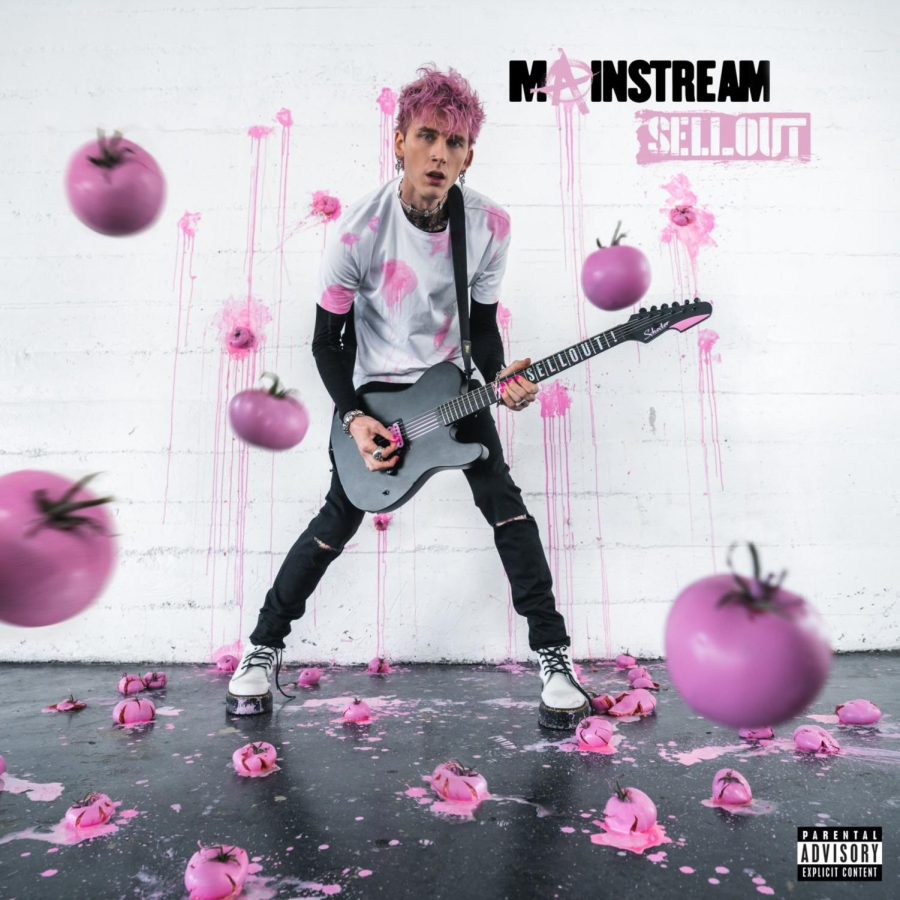MGK: Mainstream sellout? More like mainstream fallout.
On his sixth album as Machine Gun Kelly, Colton Baker revels in pathetic self-pity over bland pop-rock instrumentals.
Recently, Billboard crowned Machine Gun Kelly, or MGK, the “Prince of Pop-Punk” alongside the release of his new album, mainstream sellout. This title is surprisingly fitting, as a prince does absolutely nothing to earn his position: he’s born into it. mainstream sellout is all the proof the world should need that Machine Gun Kelly has not earned his fame.
While I’m typically the type of person to separate the art from the artist, some of MGK’s comments on his place in the scene are impossible to separate from the contents of this album. MGK has developed a sort of savior complex since the success of his rock debut and this album’s predecessor, Tickets to My Downfall. In just about every interview he sits down for, MGK takes the time to pat himself on the back for “saving” rock and guitar music.
Despite this, MGK spends most of the 40-minute runtime of mainstream sellout trying to convince listeners that he’s an outsider and a victim of unfair criticism. On the title track, MGK moans, “Leave the scene, you’re ruining it” — a direct lamentation about the kinds of criticism he gets online.
And those kinds of critics certainly do exist. But on the other hand, at the time of writing this, mainstream sellout is the #1 album on iTunes, as well as being promoted on Spotify’s homepage and social media. All of the album’s singles made the Billboard Hot 100 in the U.S., and MGK is the 180th most listened-to artist on Spotify.
But yeah, everybody hates Machine Gun Kelly. Woe is him.
This contradiction is a running theme throughout mainstream sellout. MGK seeks pity from the audience for his feelings of sadness and alienation in response to the criticism he receives but takes every opportunity he can to hype himself up. On track 13, “fake love don’t last,” he sings, “You still try to call me when you get drunk / ‘Cause out of all your exes, I’m the best one.”
Then, by the closing track, “twin flame,” an ode to MGK’s fiance, Megan Fox, that confidence has diminished. In the eye roll-worthy chorus, he sings, “You’re too good for me, I’m too bad to keep / I’m too sad, lonely.” The subject matter of neither song is inherently bad, but they display opposite emotions; this inconsistency contributes to the overall identity crisis this album suffers from.
The issues with identity go beyond the lyrical content as well. MGK is unable to fully commit to the pop-punk sound on mainstream sellout. This issue was prevalent on Tickets to My Downfall as well, but it was forgivable on Tickets since it was his first outing in a genre completely different from the rap music he used to make.
By now, MGK is an established pop-rock/pop-punk artist and should not need to lean on the crutch of rap. Despite this, mainstream sellout features two full rap songs with no rock or pop-punk elements.
Somehow, even when he’s going back to what he’s been doing since 2011, the music just isn’t good. Both rap songs are slower, more “vibey” tracks. They’re boring departures from the fast, cocky delivery in his earlier work that justified putting “Machine Gun” in his name.
Ultimately, these songs are part of the biggest problem with the album: it’s just boring. I’ve seen a lot of people defend both Tickets To My Downfall and mainstream sellout as being “just a catchy, fun throwback to 2000s pop-punk.” A throwback is a fun idea for one album, but it quickly gets old if an artist doesn’t evolve into their own sound.
Pop-punk is a homogenous genre as is. I love pop-punk, but it’s true.
The things that set songs in the genre apart are generally the hooks, whether through singing or a good guitar riff. Usually, only one of those things is necessary — I don’t think blink-182 has ever been looked to for their vocal or lyrical talent, but riffs on tracks like “Dammit” are so good that no one cares.
Mainstream sellout has none of these things. The guitars are very quiet in the mix compared to other pop-punk, the riffs (when present) don’t stand out and Travis Barker seems to be playing the same beat on every track.
Ironically for a rapper, MGK seems to now resent rhyming. Tickets To My Downfall had a few catchy choruses that made the album okay. The choruses on mainstream sellout, on the other hand, are largely just the same line repeated like four times. These are sorry excuses for hooks that fail to leave any sort of lasting impact or get stuck in my head like a good pop chorus should.
On the rare moments when the album does shine, it’s because MGK ripped off a legacy pop-punk act. The riff on “papercuts” is ripped straight from Green Day’s “Brain Stew,” while the guitars in the chorus on “maybe” are almost indistinguishable from the ones on Paramore’s “Misery Business.” While both cases should be frowned upon, there’s a deafening silence around the latter case considering “Misery Business” put a different artist at the center of controversy just last year.
Even the features are lame. I didn’t have high expectations for blackbear or iann dior in the first place, but Lil Wayne, WILLOW, and Oliver Sykes (of Bring Me The Horizon) are all great artists who we should expect solid verses from.
Despite this, neither Wayne nor Sykes contribute much to their respective songs.
WILLOW contributes … to making one of the worst songs of 2022.
“emo girl” is the most interesting song in MGK’s discography for all the wrong reasons. It sounds like the world’s best satire of scene culture, but unfortunately, the song was supposed to be genuine. MGK just bogs down other artists who work way harder to make way better music. Great pop-punk, however, is still out there if you look for it. Since the early 2010s, bands like The Story So Far, Neck Deep and State Champs have led a scene largely independent of trends in the genre popularized by MGK and other TikTok-era pop-punk singers.
So please, don’t settle for Nerf Gun Kelly.







